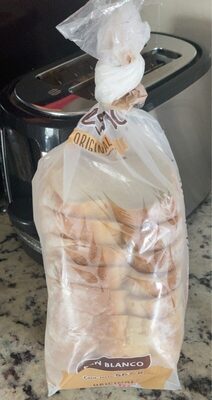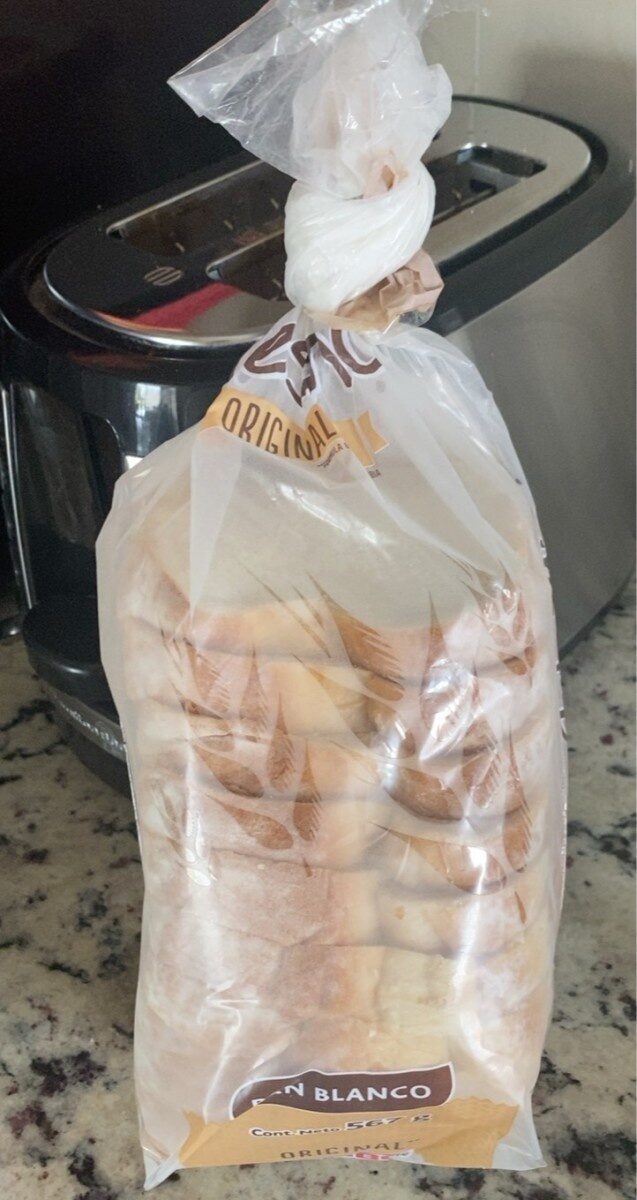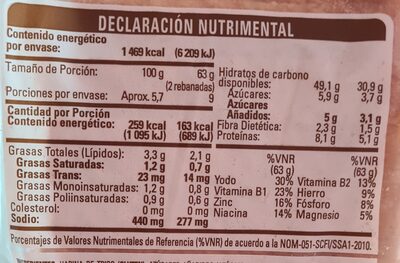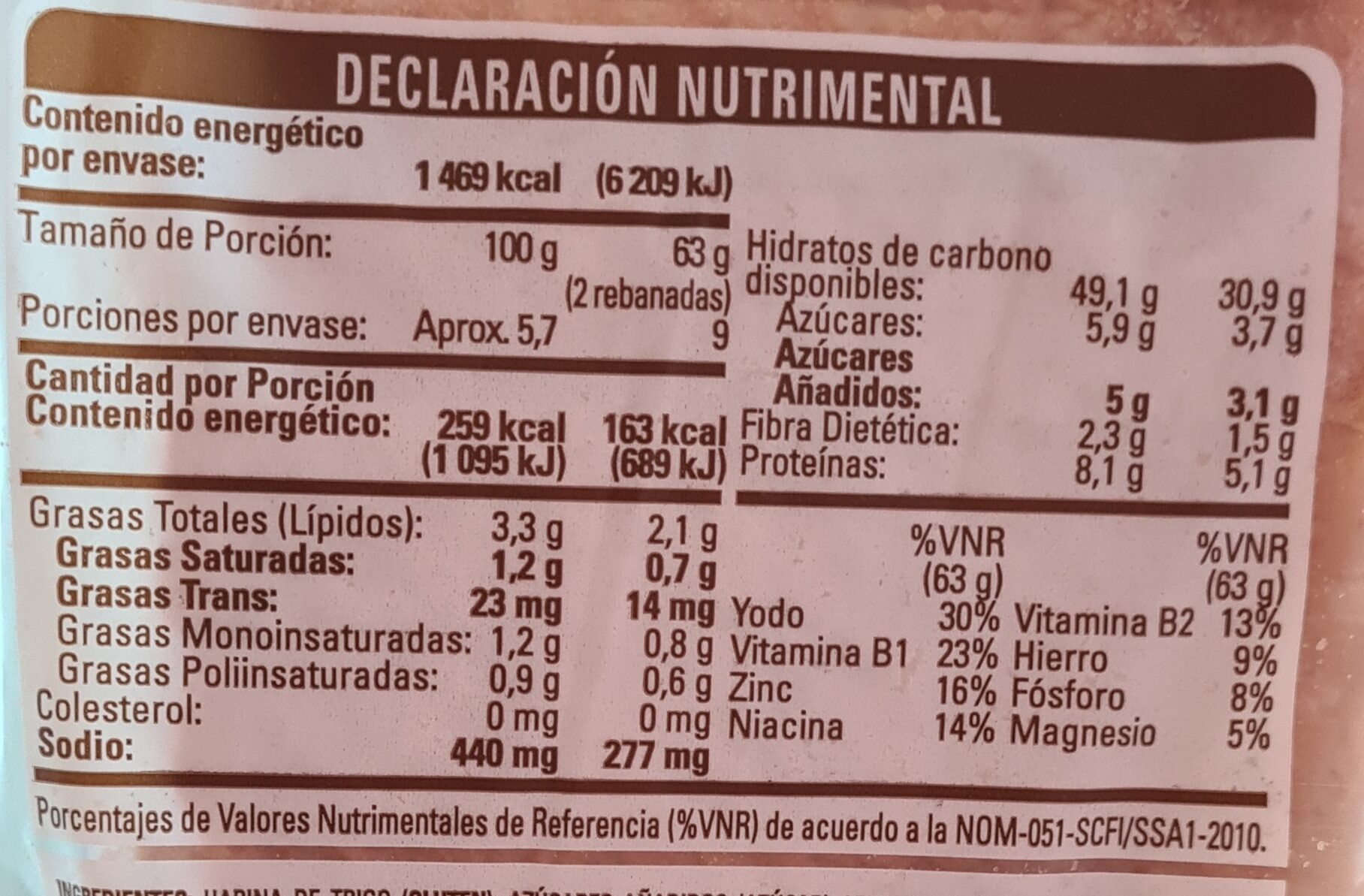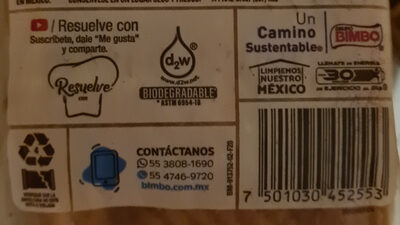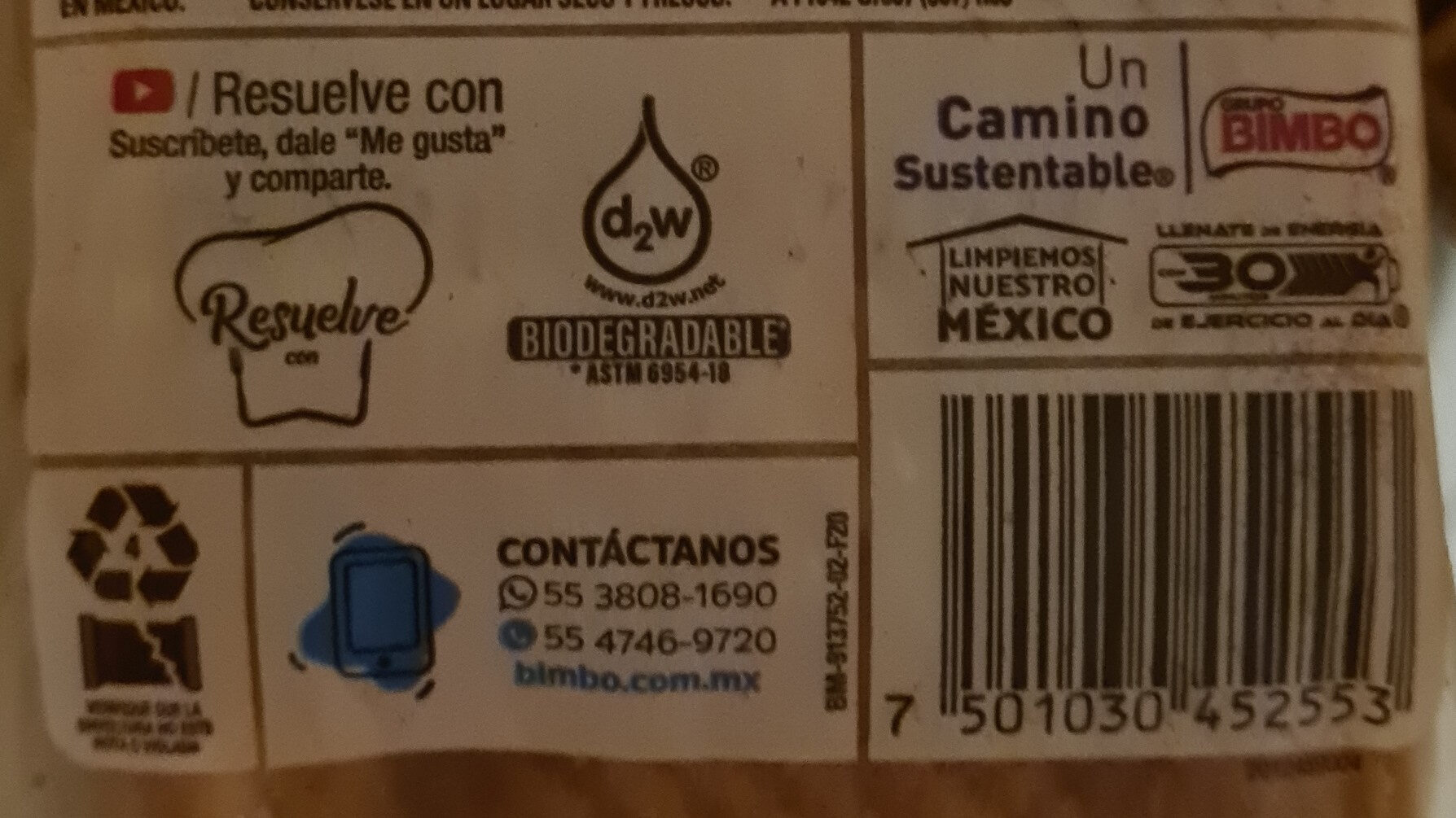Help us make food transparency the norm!
As a non-profit organization, we depend on your donations to continue informing consumers around the world about what they eat.
The food revolution starts with you!
Pan blanco artesenal - Bimbo - 567 g
Pan blanco artesenal - Bimbo - 567 g
Barcode: 7501030452553 (EAN / EAN-13)
Quantity: 567 g
Brands: Bimbo
Categories: Plant-based foods and beverages, Plant-based foods, Cereals and potatoes, Breads, Sliced breads, White breads
Origin of ingredients: Mexico
Manufacturing or processing places: Méxici
Link to the product page on the official site of the producer: http://www.bimbo.com
Stores: Soriana
Countries where sold: Mexico
Matching with your preferences
Health
Ingredients
-
14 ingredients
: HARINA DE TRIGO (GLUTEN), AZÚCAR, LEVADURA, ACEITE VEGETAL,SAL YODADA, PROPIONATO DE CALCIO, MONO Y DIGLICÉRIDOS, FOSFATO MONOCÁLCICO, GLUTEN DE TRIGO, ESTEAROIL LACTILATO DE SODIO, ENZIMAS, ÉSTERES DE ÁCIDO DIACETIL TARTÁRICO, SORBATO POTASICO, LECITINA DE SOYAAllergens: Gluten, SoybeansTraces: Eggs, Gluten, Milk, Sesame seeds, Soybeans, es:amarillo-5-nuez
Food processing
-
Ultra processed foods
Elements that indicate the product is in the 4 - Ultra processed food and drink products group:
- Additive: E322 - Lecithins
- Additive: E481 - Sodium stearoyl-2-lactylate
- Ingredient: Gluten
Food products are classified into 4 groups according to their degree of processing:
- Unprocessed or minimally processed foods
- Processed culinary ingredients
- Processed foods
- Ultra processed foods
The determination of the group is based on the category of the product and on the ingredients it contains.
Additives
-
E202 - Potassium sorbate
Potassium sorbate (E202) is a synthetic food preservative commonly used to extend the shelf life of various food products.
It works by inhibiting the growth of molds, yeast, and some bacteria, preventing spoilage. When added to foods, it helps maintain their freshness and quality.
Some studies have shown that when combined with nitrites, potassium sorbate have genotoxic activity in vitro. However, potassium sorbate is generally recognized as safe (GRAS) by regulatory authorities.
-
E282 - Calcium propionate
Calcium propanoate: Calcium propanoate or calcium propionate has the formula Ca-C2H5COO-2. It is the calcium salt of propanoic acid.Source: Wikipedia
-
E322 - Lecithins
Lecithins are natural compounds commonly used in the food industry as emulsifiers and stabilizers.
Extracted from sources like soybeans and eggs, lecithins consist of phospholipids that enhance the mixing of oil and water, ensuring smooth textures in various products like chocolates, dressings, and baked goods.
They do not present any known health risks.
-
E322i - Lecithin
Lecithins are natural compounds commonly used in the food industry as emulsifiers and stabilizers.
Extracted from sources like soybeans and eggs, lecithins consist of phospholipids that enhance the mixing of oil and water, ensuring smooth textures in various products like chocolates, dressings, and baked goods.
They do not present any known health risks.
-
E341 - Calcium phosphates
Calcium phosphate: Calcium phosphate is a family of materials and minerals containing calcium ions -Ca2+- together with inorganic phosphate anions. Some so-called calcium phosphates contain oxide and hydroxide as well. They are white solids of nutritious value.Source: Wikipedia
-
E341i - Monocalcium phosphate
Calcium phosphate: Calcium phosphate is a family of materials and minerals containing calcium ions -Ca2+- together with inorganic phosphate anions. Some so-called calcium phosphates contain oxide and hydroxide as well. They are white solids of nutritious value.Source: Wikipedia
-
E481 - Sodium stearoyl-2-lactylate
Sodium stearoyl lactylate: Sodium stearoyl-2-lactylate -sodium stearoyl lactylate or SSL- is a versatile, FDA approved food additive used to improve the mix tolerance and volume of processed foods. It is one type of a commercially available lactylate. SSL is non-toxic, biodegradable, and typically manufactured using biorenewable feedstocks. Because SSL is a safe and highly effective food additive, it is used in a wide variety of products ranging from baked goods and desserts to pet foods.As described by the Food Chemicals Codex 7th edition, SSL is a cream-colored powder or brittle solid. SSL is currently manufactured by the esterification of stearic acid with lactic acid and partially neutralized with either food-grade soda ash -sodium carbonate- or caustic soda -concentrated sodium hydroxide-. Commercial grade SSL is a mixture of sodium salts of stearoyl lactylic acids and minor proportions of other sodium salts of related acids. The HLB for SSL is 10-12. SSL is slightly hygroscopic, soluble in ethanol and in hot oil or fat, and dispersible in warm water. These properties are the reason that SSL is an excellent emulsifier for fat-in-water emulsions and can also function as a humectant.Source: Wikipedia
Ingredients analysis
-
May contain palm oil
Ingredients that may contain palm oil: Vegetable oil, E481
-
Vegan status unknown
Unrecognized ingredients: es:mono-y-digliceridos, es:esteres-de-acido-diacetil-tartaricoSome ingredients could not be recognized.
We need your help!
You can help us recognize more ingredients and better analyze the list of ingredients for this product and others:
- Edit this product page to correct spelling mistakes in the ingredients list, and/or to remove ingredients in other languages and sentences that are not related to the ingredients.
- Add new entries, synonyms or translations to our multilingual lists of ingredients, ingredient processing methods, and labels.
If you would like to help, join the #ingredients channel on our Slack discussion space and/or learn about ingredients analysis on our wiki. Thank you!
-
Vegetarian status unknown
Unrecognized ingredients: es:mono-y-digliceridos, es:esteres-de-acido-diacetil-tartaricoSome ingredients could not be recognized.
We need your help!
You can help us recognize more ingredients and better analyze the list of ingredients for this product and others:
- Edit this product page to correct spelling mistakes in the ingredients list, and/or to remove ingredients in other languages and sentences that are not related to the ingredients.
- Add new entries, synonyms or translations to our multilingual lists of ingredients, ingredient processing methods, and labels.
If you would like to help, join the #ingredients channel on our Slack discussion space and/or learn about ingredients analysis on our wiki. Thank you!
-
Details of the analysis of the ingredients
We need your help!
Some ingredients could not be recognized.
We need your help!
You can help us recognize more ingredients and better analyze the list of ingredients for this product and others:
- Edit this product page to correct spelling mistakes in the ingredients list, and/or to remove ingredients in other languages and sentences that are not related to the ingredients.
- Add new entries, synonyms or translations to our multilingual lists of ingredients, ingredient processing methods, and labels.
If you would like to help, join the #ingredients channel on our Slack discussion space and/or learn about ingredients analysis on our wiki. Thank you!
: HARINA DE TRIGO, AZÚCAR, LEVADURA, ACEITE VEGETAL, SAL YODADA, PROPIONATO DE CALCIO, mono- y DIGLICÉRIDOS, FOSFATO MONOCÁLCICO, GLUTEN DE TRIGO, ESTEAROIL LACTILATO DE SODIO, ENZIMAS, ÉSTERES DE ÁCIDO DIACETIL TARTÁRICO, SORBATO POTASICO, LECITINA DE SOYA- HARINA DE TRIGO -> en:wheat-flour - vegan: yes - vegetarian: yes - ciqual_proxy_food_code: 9410 - percent_min: 82.042 - percent_max: 100
- AZÚCAR -> en:sugar - vegan: yes - vegetarian: yes - ciqual_proxy_food_code: 31016 - percent_min: 0 - percent_max: 3.7
- LEVADURA -> en:yeast - vegan: yes - vegetarian: yes - percent_min: 0 - percent_max: 3.7
- ACEITE VEGETAL -> en:vegetable-oil - vegan: yes - vegetarian: yes - from_palm_oil: maybe - percent_min: 0 - percent_max: 3.7
- SAL YODADA -> en:iodised-salt - vegan: yes - vegetarian: yes - ciqual_food_code: 11058 - percent_min: 0 - percent_max: 0.6858
- PROPIONATO DE CALCIO -> en:e282 - vegan: yes - vegetarian: yes - percent_min: 0 - percent_max: 0.6858
- mono- y DIGLICÉRIDOS -> es:mono-y-digliceridos - percent_min: 0 - percent_max: 0.6858
- FOSFATO MONOCÁLCICO -> en:e341i - vegan: yes - vegetarian: yes - percent_min: 0 - percent_max: 0.6858
- GLUTEN DE TRIGO -> en:wheat-gluten - vegan: yes - vegetarian: yes - percent_min: 0 - percent_max: 0.6858
- ESTEAROIL LACTILATO DE SODIO -> en:e481 - vegan: maybe - vegetarian: maybe - from_palm_oil: maybe - percent_min: 0 - percent_max: 0.6858
- ENZIMAS -> en:enzyme - vegan: maybe - vegetarian: maybe - percent_min: 0 - percent_max: 0.6858
- ÉSTERES DE ÁCIDO DIACETIL TARTÁRICO -> es:esteres-de-acido-diacetil-tartarico - percent_min: 0 - percent_max: 0.6858
- SORBATO POTASICO -> en:e202 - vegan: yes - vegetarian: yes - percent_min: 0 - percent_max: 0.6858
- LECITINA DE SOYA -> en:soya-lecithin - vegan: yes - vegetarian: yes - ciqual_food_code: 42200 - percent_min: 0 - percent_max: 0.6858
Nutrition
-
Very good nutritional quality
⚠ ️Warning: the amount of fruits, vegetables and nuts is not specified on the label, it was estimated from the list of ingredients: 0This product is not considered a beverage for the calculation of the Nutri-Score.
Positive points: 6
- Proteins: 3 / 5 (value: 5.1, rounded value: 5.1)
- Fiber: 3 / 5 (value: 3.1, rounded value: 3.1)
- Fruits, vegetables, nuts, and colza/walnut/olive oils: 0 / 5 (value: 0, rounded value: 0)
Negative points: 5
- Energy: 2 / 10 (value: 689, rounded value: 689)
- Sugars: 0 / 10 (value: 3.7, rounded value: 3.7)
- Saturated fat: 0 / 10 (value: 0.7, rounded value: 0.7)
- Sodium: 3 / 10 (value: 274.32, rounded value: 274.3)
The points for proteins are counted because the negative points are less than 11.
Nutritional score: (5 - 6)
Nutri-Score:
-
Nutrient levels
-
Fat in low quantity (2.1%)
What you need to know- A high consumption of fat, especially saturated fats, can raise cholesterol, which increases the risk of heart diseases.
Recommendation: Limit the consumption of fat and saturated fat- Choose products with lower fat and saturated fat content.
-
Saturated fat in low quantity (0.7%)
What you need to know- A high consumption of fat, especially saturated fats, can raise cholesterol, which increases the risk of heart diseases.
Recommendation: Limit the consumption of fat and saturated fat- Choose products with lower fat and saturated fat content.
-
Sugars in low quantity (3.7%)
What you need to know- A high consumption of sugar can cause weight gain and tooth decay. It also augments the risk of type 2 diabetes and cardio-vascular diseases.
Recommendation: Limit the consumption of sugar and sugary drinks- Sugary drinks (such as sodas, fruit beverages, and fruit juices and nectars) should be limited as much as possible (no more than 1 glass a day).
- Choose products with lower sugar content and reduce the consumption of products with added sugars.
-
Salt in moderate quantity (0.686%)
What you need to know- A high consumption of salt (or sodium) can cause raised blood pressure, which can increase the risk of heart disease and stroke.
- Many people who have high blood pressure do not know it, as there are often no symptoms.
- Most people consume too much salt (on average 9 to 12 grams per day), around twice the recommended maximum level of intake.
Recommendation: Limit the consumption of salt and salted food- Reduce the quantity of salt used when cooking, and don't salt again at the table.
- Limit the consumption of salty snacks and choose products with lower salt content.
-
-
Nutrition facts
Nutrition facts As sold
for 100 g / 100 mlAs sold
per serving (63g)Compared to: White breads Energy 689 kj
(163 kcal)434 kj
(103 kcal)-40% Fat 2.1 g 1.32 g -53% Saturated fat 0.7 g 0.441 g -19% Monounsaturated fat 0.8 g 0.504 g +550% Polyunsaturated fat 0.6 g 0.378 g -38% Trans fat 14 g 8.82 g Cholesterol 0 mg 0 mg Carbohydrates 30.9 g 19.5 g -37% Sugars 3.7 g 2.33 g +10% Fiber 3.1 g 1.95 g -22% Proteins 5.1 g 3.21 g -42% Salt 0.686 g 0.432 g -40% Alcohol 0 % vol 0 % vol Vitamin B1 (Thiamin) 10,000 mg 6,300 mg +124,278% Vitamin B2 (Riboflavin) 0 mg 0 mg -100% Vitamin B6 (Pyridoxin) 0 mg 0 mg -100% Calcium 60 mg 37.8 mg -37% Phosphorus 60 mg 37.8 mg -52% Iron 0 mg 0 mg -100% Zinc 0 mg 0 mg -100% Iodine 0 µg 0 µg Fruits‚ vegetables‚ nuts and rapeseed‚ walnut and olive oils (estimate from ingredients list analysis) 0 % 0 %
Environment
-
Eco-Score B - Low environmental impact
⚠ ️Select a country in order to include the full impact of transportation.The Eco-Score is an experimental score that summarizes the environmental impacts of food products.→ The Eco-Score was initially developped for France and it is being extended to other European countries. The Eco-Score formula is subject to change as it is regularly improved to make it more precise and better suited to each country.Life cycle analysis
-
Average impact of products of the same category: A (Score: 90/100)
Category: Sandwich loaf
Category: Sandwich loaf
- PEF environmental score: 0.19 (the lower the score, the lower the impact)
- including impact on climate change: 1.76 kg CO2 eq/kg of product
Stage Impact Agriculture
58.9 %Processing
23.6 %Packaging
12.2 %Transportation
4.8 %Distribution
0.4 %Consumption
0.0 %
Bonuses and maluses
-
Origins of ingredients with a high impact
Malus: -3
Environmental policy: -3
Transportation: 0
Origin of the product and/or its ingredients % of ingredients Impact Mexico 100 %High
-
Packaging with a medium impact
Malus: -10
Shape Material Recycling Impact Bag Plastic High
Eco-Score for this product
-
Impact for this product: B (Score: 77/100)
Product: Pan blanco artesenal - Bimbo - 567 g
Life cycle analysis score: 90
Sum of bonuses and maluses: -13
Final score: 77/100
-
Carbon footprint
-
Equal to driving 0.9 km in a petrol car
176 g CO² per 100g of product
The carbon emission figure comes from ADEME's Agribalyse database, for the category: Sandwich loaf (Source: ADEME Agribalyse Database)
Stage Impact Agriculture
59.3 %Processing
17.8 %Packaging
16.0 %Transportation
6.7 %Distribution
0.3 %Consumption
0.0 %
Packaging
-
Packaging with a medium impact
-
Packaging parts
Bag (Plastic)
-
Packaging materials
Material % Packaging weight Packaging weight per 100 g of product Plastic
-
Transportation
-
Origins of ingredients
Origins of ingredients with a high impact
Origin of the product and/or its ingredients % of ingredients Impact Mexico 100 %High
Report a problem
-
Incomplete or incorrect information?
Category, labels, ingredients, allergens, nutritional information, photos etc.
If the information does not match the information on the packaging, please complete or correct it. Open Food Facts is a collaborative database, and every contribution is useful for all.
Data sources
Product added on by elcoco
Last edit of product page on by bytes2000.
Product page also edited by boloni225, daec84, ecoscore-impact-estimator, elcoco.f3b43a5fe9447e019be9d01eb01ebecb, kiliweb, openfoodfacts-contributors, packbot, yuka.sY2b0xO6T85zoF3NwEKvlklaDOLjh27AMTDuoUSL_cqcPJvBT89YvdncI6s.
